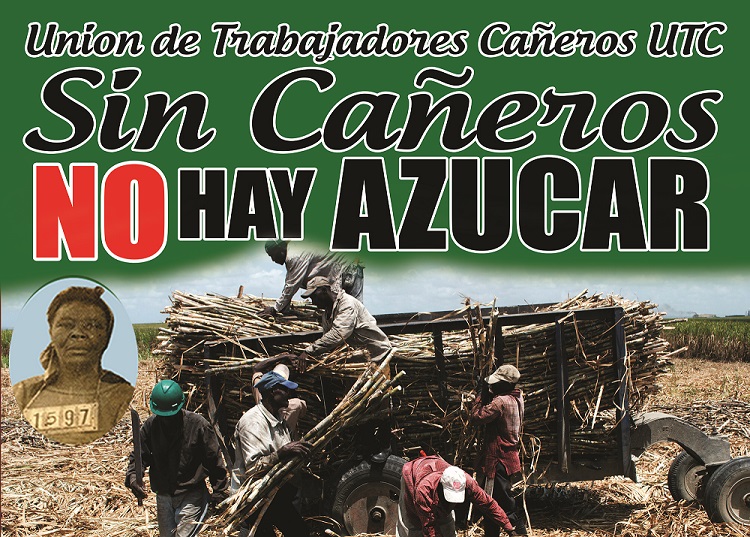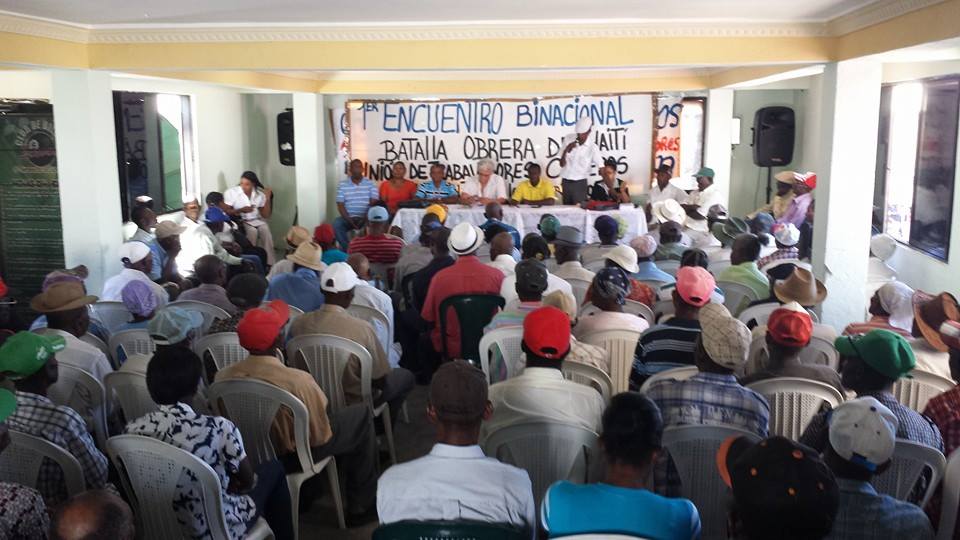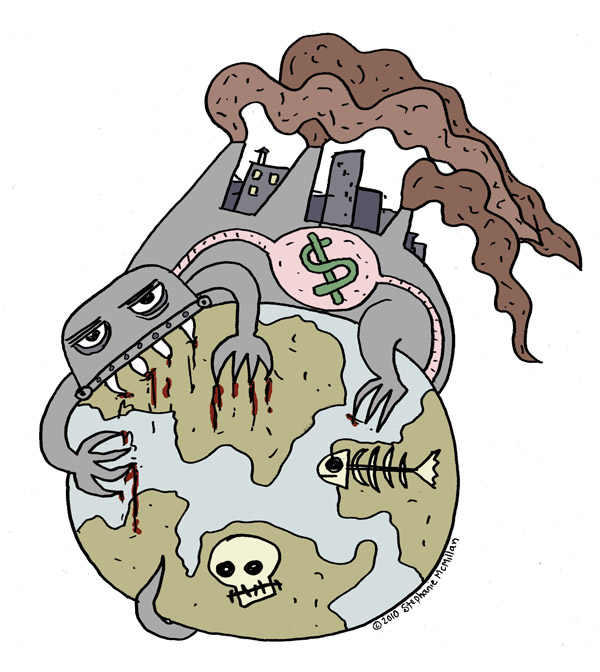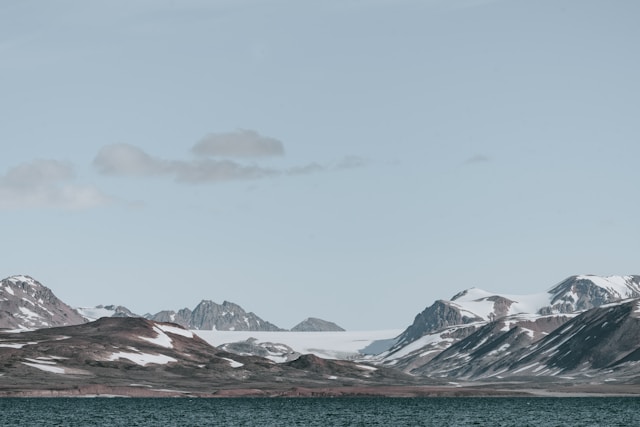
by DGR Colorado Plateau | Dec 17, 2015 | Worker Exploitation, Worker Solidarity
By One Struggle
On what I earn, I can’t afford shoes… We are poor, poor, poor. There are days we go to bed without food. – Batey worker from the film, “The Price of Sugar”
In the sugar plantations or bateyes of Dominican Republic, cane cutters often work barefoot. They can’t afford shoes. They can barely afford food, for that matter, despite the fact that they often work a minimum of 12 hours a day, doing the back-breaking work of cutting sugar cane by hand.
On the other side of the border that divides Hispaniola, Haitian garment workers in Port Au Prince recently blockaded a Korean factory because of bounced paychecks. For years, Haitian garment workers have been fighting wage theft and to be paid the inadequate legal minimum wage – still not enough to live off of.
Whatever the product is – the pair of pants, the t-shirt – we are the ones producing it. We labor hard, and don’t get paid. – Haitian garment worker of SOTA in Port Au Prince
This week Unión De Trabajadores Cañeros De Los Bateyes (Union of the Bateyes of Sugarcane Workers) and Sendika Ouvriye Takstil ak Abiman (SOTA) (Union of Textile and Garment Workers) will meet to discuss their common struggles against exploitation.
Specifically, they are meeting about recent actions of the DR government to strip people of Haitian descent of their citizenship. This has mostly affected the poor – cane cutters, street vendors, and service laborers. In bringing attention and their perspective to this struggle, the groups’ intentions are to put down false divisions of racism and nationalism, with the goal of working together against their common enemy – the Haitian and Dominican ruling classes.

SOTA is affiliated with the autonomous workers’ organization, Batay Ouvriye (BO) (Workers Fight), which will host a series of meetings, a press conference, and direct action in Port Au Prince.
According to one of the event organizers, “They will be three Haitian cane workers, one Dominican cane worker and the coordinator of the union. The presence of the Dominican cane worker is to deny the nationalist option and to put the class situation in concrete relief, in contrast to the bourgeois organizations here who pretend to defend their ‘compatriots.’”
There is a long history of animosity between Haiti and Dominican Republic. Both nationalism and racism are deep rooted. The DR won its independence, not from European colonialists, but from Haiti. Since then, Haitians living in the DR have faced discrimination, and thousands of Haitians and Dominicans of Haitian descent were massacred under Dominican dictator, Rafael Trujillo.
In 2013, the Dominican Supreme Court retroactively withdrew citizenship from anyone born in the DR to undocumented immigrants, with the provision that persons who submitted the proper documentation could apply for legal residency. The deadline for this application was summer 2015. However, many who submitted this paperwork, along with hundreds of dollars in fees, never received any notice or proper documentation from the government. Thousands of Haitians and Dominicans of Haitian descent left the DR, or were rounded up and dropped at the Haitian/Dominican border, often without being able to gather their belongings or to alert their families.
So now, there are hundreds of thousands of people rendered stateless, living in temporary shanty-towns along the border. They’ve been told that if they get documentation proving their country of origin from the Haitian government, then they can apply for Dominican citizenship or work visas. In fact, the Haitian government was paid by the Dominican government to facilitate this process, but Haitians living in limbo on the border have seen no results from this transaction.
Another issue affecting cane workers and low-wage laborers is that for years many paid into social security in the DR. Once they stopped working, they apply for their pensions, submitting the required paperwork to DR government and received nothing. Or, if they’ve been deported, they have no means of claiming their pension either.
This situation is not just about racism or nationalism. It is an issue of the ruling classes of both countries exploiting and stealing from the poor and working class. This summer, many demonstrations were held, especially in New York and Miami, with calls for travel boycotts against the DR and urgent appeals to avert a humanitarian crisis. Most of these demands have been voiced from people outside of the DR/Haiti, or removed from the exploitation of the bateyes and the temporary shanty-towns.
The aim with this series of meetings between workers from both countries is to bring attention to calls and demands led by the workers and people directly affected by these struggles. These are the people whose demands should be amplified, and calls for action should be followed.

Here in the U.S. we use Dominican sugar in our coffee every day. Our clothing is made in sweatshops, often sewn in Haiti (thanks to HELP and HOPE Acts). Capitalism and imperialism give us no choice, no say in how goods are produced. Our sugar and our clothing are the results of wage theft and a politic of misery for the working class in dominated countries. Boycotts and conscious consumerism pretend that with our purchasing, exploitation can be ameliorated. In reality, it is merely shifted to another part of the world. We need to understand the dynamics of capitalism/imperialism, its inherent exploitation, and we must address these issues from the interests of the working class. Who better to lead this effort than the workers themselves?
Read more at One Struggle

by Deep Green Resistance News Service | Jun 26, 2012 | Human Supremacy, Movement Building & Support, Worker Solidarity
By Stephanie McMillan
Global capitalism is killing the planet. It is turning the living world into dead commodities by exploiting the many for the profit of a few.
Ecocide is the most urgent and immediate problem we face. If we don’t solve it, nothing else will matter. Economic troubles (not to mention our personal issues) will seem trivial. The ability of the planet to sustain life of any kind is becoming increasingly threatened.
It may already be too late to avoid runaway global warming; and it’s certainly too late to avoid radioactive rain, shrimp without eyes in the Gulf of Mexico, and tap water that can be lit on fire. It’s too late to save 78 percent of the world’s old-growth forests or bring back the 200 species of plants and animals that went extinct today. The situation is extremely dire.
But we can’t give up – not without a fight. Precisely as the economic and ecological crises converge, the possibility of liberation and social transformation also opens up. But only if we organize to make that happen.
Ecocide is accelerating because of capitalism’s constant need to expand into new areas. Capitalists have entered a period of extreme extraction, even in areas that were previously off-limits geographically and politically. They’re now ripping up North America as wantonly as they’ve already wrecked other parts of the world, with fracking, oil from tar sands and deep-sea drilling, and mountaintop removal.
Because of competition between capitalists, which leads to a falling rate of profit, capitalism is structurally compelled to expand. It can never economically catch up with itself and must constantly break through its limits in a vain attempt to resolve its own inherent internal contradiction.
Feudalism and all forms of class society have also had internal contradictions that drove them to expand. But capitalism has taken this to a new level, because instead of just requiring more resources to continue existing (to feed an expanding agrarian population, for example), it requires the constant growth of production to expand for its own sake. The needs of the population aren’t the point, and commodities aren’t even the point – accumulating surplus value to expand capital itself is the entire point. This is what pushes it to exceed limits on a scale previously unimaginable.
But we live on a finite planet with physical limits, which are being reached. This is a difference from earlier economic crises. Capitalism is driven to consume everything external to itself, converting it to commodities, and it won’t stop doing so on its own until it kills all life on the planet. Capitalism is fundamentally in contradiction with life itself.
The system won’t stop unless we stop it.
The system has many methods of dealing with dissent. One is open repression.
Before they resort to that, they try everything else, including co-opting dissent. They draw it into dead ends created for this purpose. As long as we don’t threaten the actual relationship of power, we have many ineffective means of dissent that we’re permitted to exercise.
But capitalism can’t be reasoned with, escaped, reformed, redeemed, cajoled, abandoned, or rejected. It does not care what we want or how persuasively (or how nicely, or how rudely) we request it.
Elections won’t change this. “Less evil” politicians still serve and represent capitalist interests. It’s their job.
Personal lifestyle changes, though nice, will not make it stop. Protests and demonstrations won’t make it stop.
A better-regulated or reformed capitalism would still kill the planet. So-called “green” capitalism and technotopianism are lies to make us believe an expansionist economy could be sustainable. We can’t buy our way out of it.
If we are to liberate ourselves from this horror – if we are even to survive – we must work together to fight global capitalism and its crimes, toward the ultimate goal of bringing it down.
The system has been built on land theft, war, and slavery. It steals the means of subsistence from indigenous populations and small farmers, putting everyone in a situation of dependency, forced to sell our labor to get food and shelter.
A system based on the pursuit of profit and perpetual expansion can never be fair or sustainable. We need to study and analyze its mechanisms and motion, and identify its weaknesses and vulnerabilities.
We can attack it on many fronts, but at the center of it is the conversion of raw materials (life) into commodities through the capitalist exploitation of labor. The point is the creation of surplus value (profit) by the worker, which the capitalist appropriates – in other words, steals. There is no other reason for commodities to be produced.
To end this nightmare, workers will have to organize to liberate themselves. They are the only ones who can break the social relation of class domination, a relation that is at the core of a mode of production that requires the extraction of resources and the exploitation of workers, and results in the destruction of the environment.
In addition, we must build organizations of various types that bring to bear the energy and interests of all the popular classes and social groupings to weaken capitalism. As the crises become more acute and affect people more immediately, increasing numbers of people will come into motion to oppose it. We need to find ways of uniting all those who are antagonistic to capitalism, from various perspectives, and work together to defeat and dismantle it.
Movements for social liberation must ally with movements to defend the natural world, or we won’t be able to achieve either goal. We need a diverse, non-sectarian mass movement that can increase our chances for victory against our common enemy.
If we want to win, we must organize and align our efforts. Individually we’re weak and ineffective; together we are strong.
Let’s build a broad and autonomous movement to fight capitalism, before it destroys us!
From saltyeggs:
by Deep Green Resistance News Service | Mar 22, 2012 | Human Supremacy, Movement Building & Support, Worker Exploitation, Worker Solidarity
By Stephanie McMillan
Environmental destruction is the most urgent and immediate problem we face. If we don’t solve it, nothing else will matter. I would argue that it’s the principle contradiction of the current period. Through it, the common ruin of contending classes is becoming increasingly likely, but as the economic and ecological crises converge, the possibility of liberation and social transformation also opens up. But only if we organize to make that happen.
The problem is accelerating because of capital’s constant need to expand into new areas. They have entered a period of extreme extraction, on a scale never before seen: fracking, oil from tar sands and deep sea drilling, mountaintop removal. Because of the falling rate of profit, capitalism can never economically catch up with itself and must constantly break through its limits in a vain attempt to resolve its own inherent internal contradiction.
Feudalism and all forms of class society have had internal contradictions that drove them to expand. But capitalism has taken this to a new level, because instead of just requiring more resources to continue existing (to feed an expanding agrarian population, for example), it requires constant growth of production to expand for its own sake. The needs of the population aren’t the point, and commodities aren’t even the point—accumulating surplus-value to expand capital itself is the entire point. This is what pushes it to exceed limits on a scale previously unimaginable.
But we live on a finite planet with physical limits, that are being reached. This is a difference from earlier economic crises. Capitalism is driven to consume everything external to itself, converting it to commodities, and it won’t stop doing so on its own until it kills all life on the planet. Capitalism is fundamentally in contradiction with life itself.
As this problem becomes more acute, and affects people more immediately, more people will come into motion to oppose it. We need to find ways of uniting those who can fight capitalism from both the standpoint of class liberation, and from an environmentalist perspective, or more precisely, biocentrism. Alone, neither can achieve a sustainable and classless future society. These movements are allied and complementary. Each will have different strategies and approaches, but both will have better chances for success the more they cooperate in the immediate period.
Each movement currently has gaps, which are filled in by the other. The major flaw in movements for class liberation has been anthropocentrism, a total focus on human needs and a utilitarian view of nature.
The major flaw of environmentalism (and the contemporary labor movement in the US as well, which has been destroyed or co-opted by sold-out unions) has been a lack of class analysis and a lack of understanding of capitalism as a system that needs to be dismantled, an economic system characterized by class domination and protected by a state that needs to be defeated. Because of this incomplete picture, many fall victim to illusions of reformism, bourgeois democracy, technotopianism, lifestylism, green capitalism, and other dead end schemes.
Many radical or deep green environmentalists get closer to the heart of the problem and fight to defend land and decrease production. These are both necessary, but not alone sufficient. We can not win—we can neither liberate ourselves nor save the planet—without defeating and dismantling the entire system of capitalism and fundamentally transforming the structure of society on a classless basis.
We can attack capitalism on many fronts, but at the center of it is the conversion of raw materials (life) into commodities through the capitalist exploitation of labor. The point is the extraction of surplus value from the worker. There is no other reason for commodities to be produced. So we must break the social relation of class domination that makes exploitation possible, and which characterizes a mode of production that requires the extraction of resources and results in the destruction of the environment.
On the left, the theory of productive forces has led to a widespread productivist/mechanical view of reaching socialism: by developing and fully mechanizing production, we will reach reach abundance and the end of labor itself. It is increasingly obvious that this scenario at odds with the reality around us, yet there is a general reluctance to tell the truth: that a lot of production, everything not necessary for survival, simply has to end. No one likes being the person who brings the bad news that we have to make do with less. It’s harder to organize around.
And so the idea of socialism, the common ownership of the means of production and equitable distribution of goods, also doesn’t go far enough. We need to change our relationship with the natural world. It is not there for us to use, but instead we are part of it and depend on its overall health. We need to define a different relationship with it than as a set of resources. A sustainable economy can only involve production that is subordinate to nature and that fits within its physical limits to reproduce itself—that is determined not by human desires and whims, but by our actual needs, which are dependent on a healthy planet above all.
The system fosters the illusion of a contradiction between the interests of the dominated classes (the working class in particular)—and the ecosystem that we all depend upon for life. Through the dispossession of land-based peoples at its stage of primary accumulation, capitalism creates a situation of dependency for workers, who no longer have access to their own traditional means of subsistence.
This is how they’ve set us up to demand that our needs be satisfied in ways that actually help the enemy and harm ourselves. For example, the demand for jobs is almost unquestioned in the labor movement, but this demand only helps the capitalist to further exploit us at cheaper rates. What we should be demanding is a universal income, which would hinder exploitation, hurt capital, and would be compatible with the ecological necessity of reducing production.
Instead of demanding a temporary job building a pipeline, for example, we need to be insisting on the right to a livable income whether we have a job or not. And if we’re unemployed, we should be spending our time joining those who are putting themselves on the line to stand in the way of oil pipelines, mountaintop removal, and nuclear power plants – such as the five Lakotas who were arrested a couple of weeks ago for participating in a successful community blockade of trucks that were coming onto Pine Ridge Indian land in South Dakota with materials for building the Keystone XL tar sands oil pipeline.
We must build organizations that bring to bear the energy and interests of all the popular classes and social groupings against capitalism. For reds, a major task is to build autonomous organizations of the working class to break capitalists’ ability to accumulate surplus value. In addition, capital should be blocked at the various points in its flow, and alliances are needed to build mass movements that can attack capitalism at each of these points—including and especially (as the ecological crisis becomes increasingly acute), defending the land by preventing extraction.
Indigenous struggles, in particular, need to be supported and allied with as part of any anti-capitalist initiative. For one thing, it must be acknowledged and addressed that the land that provides all our sustenance has been stolen and colonized. Furthermore, indigenous peoples and subsistence farmers are the only groups who have practice with living sustainably, who can offer alternatives to this way of life that have been proven successful.
The extraction of resources and the exploitation of labor could not even occur without dispossessing people of the land that previously sustained them, a dispossession that continues and a subsequent degradation that has accelerated to an apocalyptic rate. These economic processes are intertwined, mutually compulsory, defining elements of capitalist production, and a combined effort to stop both have a much better chance of defeating our common enemy.
From Press Action: http://web.archive.org/web/20130419191311/http://www.pressaction.com/news/weblog/full_article/mcmillan03202012/

by Deep Green Resistance News Service | Feb 19, 2012 | Mining & Drilling, Women & Radical Feminism, Worker Solidarity
By Defenders of Wildlife
The House of Representatives voted on Feb. 16 to open the pristine Arctic National Wildlife Refuge, and along almost every acre of our coastline including off the East Coast, West Coast, the protected eastern Gulf of Mexico and Alaska’s Bristol Bay to oil drilling all under the guise of funding this year’s transportation bill.
The funding issue is a scam. Even the most generous revenue estimates from this reckless expansion of drilling will not be enough to fund proposed transportation projects in the bill. In addition, what small amounts of revenue might be generated from oil and gas leasing in the Arctic refuge would not be seen for ten years as oil companies will still need to explore, apply for drilling permits and start development. In short, H.R. 3408 is a fiscal gimmick that relies on unknown future revenues that are speculative at best to pay for transportation projects today.
Upon passage of the bill, Defenders’ president and CEO Jamie Rappaport Clark, said, “Today, the House approved the most radical drilling-bill we have seen in recent memory. This fiscal boondoggle would industrialize the pristine coastal plain of the Arctic National Wildlife Refuge, home to iconic wildlife like polar bears and the Porcupine Caribou herd, exposing thousands of miles of coastline to chronic pollution from offshore drilling and potential oil disasters like the Deepwater Horizon.
The Arctic refuge is the largest onshore denning area for America’s polar bears.
The vote comes only one day after an exploratory well exploded on Alaska’s North Slope, spewing drilling mud, leaking natural gas and requiring the intervention of a company specializing in blowout control.
“Yesterday’s exploratory well explosion on Alaska’s North Slope demonstrates once again that drilling is a dangerous business. We can’t afford to take those risks with some of our most pristine and fragile places, some of which may never recover should a drilling accident occur. The Senate should reject this funding scam and look for realistic ways to meet our transportation needs without sacrificing the health of our environment.”
From Ecowatch
Photo by Annie Spratt on Unsplash





